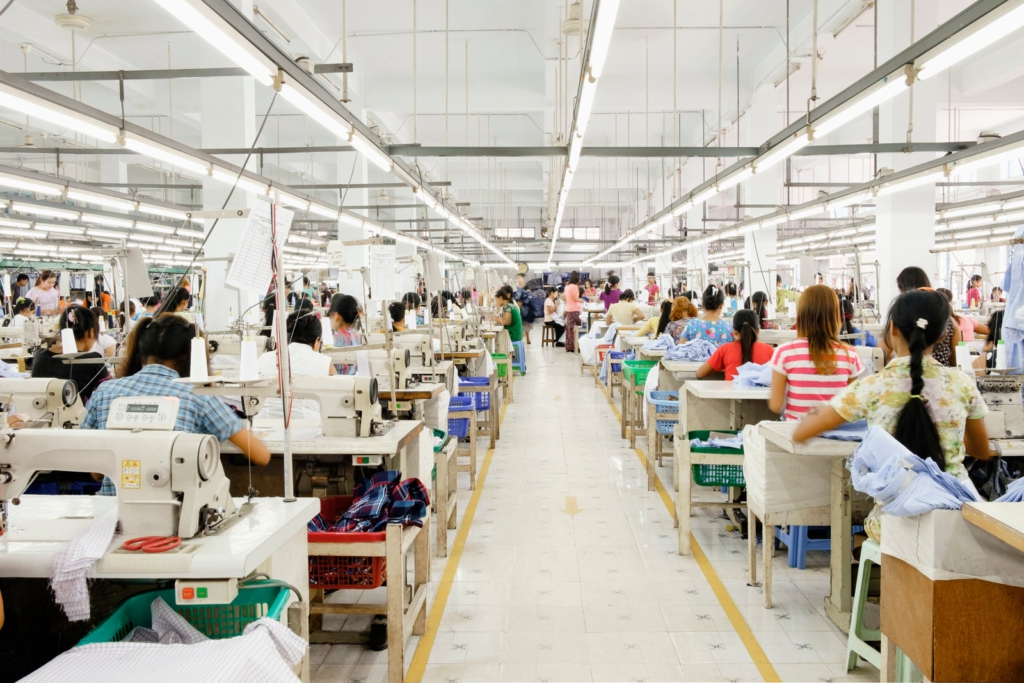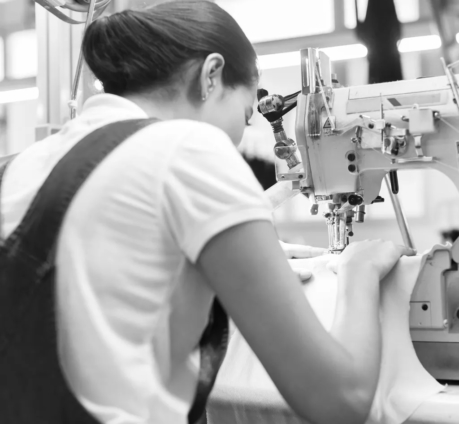Since the pandemic hit, millions of garment workers around the world have been left in utterly desperate situations, unable to pay for basic needs such as food and rent.
Thousands have lost their jobs or seen dramatic reductions in their wages, as major brands in the US and Europe cancelled or refused to pay for an estimated $16.2bn worth of ordersfrom April to June 2020 alone.
“It’s been massively concerning that brands are turning their backs on the supply chain, which they have profited from for decades,” Christie Miedema, campaign and outreach co-ordinator at the Clean Clothes Campaign, a global network working to improve conditions in the garment industry, tells Vogue.
“It's unfathomable that people who are already living on a poverty wage, and have never had a chance to save any money, don't have anything to fall back on.”
Shockingly, a report published by the Worker Rights Consortium in November 2020 found that nearlyg 80 per cent of garment workers surveyed have been going hungry.
Working conditions have deteriorated rapidly as both factories, and in turn employees, are under increasing pressure to produce garments more quickly due to price cuts from retailers.
There have been widespread reports of ‘union busting’ with union members and labour activists targeted disproportionately by lay-offs.
The pandemic has also left female garment workers—who make up around 85 per cent of the industry—at a greater risk of violence and sexual harassment.
In India, 20-year-old garment worker Jeyasre Kathiravel was allegedly raped and killed by her supervisor at an H&M supply factory after months of harassment.
H&M said it has launched an independent investigation into her death, which will be conducted by the Worker Rights Consortium, and added: “H&M Group is taking this situation incredibly seriously, and recognise that we have responsibility to ensure workers are safe throughout our supply chain.
We are continuing to work with the relevant trade union to find the best way forward.”
Campaigners are now demanding that brands not only #PayUp for their orders, but take responsibility for their supply chains. This includes ensuring garment workers are paid a living wage and have safe working conditions, as well as advocating for laws that will protect workers.
“A lot of brands simply don’t consider the people who make their products their workers,” says Ayesha Barenblat, founder and CEO of nonprofit Remake, one of the organisations behind the #PayUp campaign. “The pandemic has exacerbated a lot of glaring problems that exist in the fashion system — this needs to be a turning point.”
We spoke to garment workers in Bangladesh, Sri Lanka, Cambodia, Ethiopia and the US to find out more about how the pandemic has affected their lives.

Sadiya*, 25, Dhaka, Bangladesh
“I’d been working in the same garment factory for more than five years before I got laid off. After Covid-19 hit, the factory closed in April and I lost my job as a quality inspector. My husband, who also worked at the factory, also lost his job at the same time.
“It’s been really difficult because both of our families depend on us for income. I didn’t get my full severance pay and had to take out a loan of 40,000 taka (£339). We were renting a house before, but we’ve had to move as we could no longer afford the rent. We can pay for basic food, but don’t have meat with our meals any more and we can’t afford the medicine we need.
Hosana, 24, Addis Ababa, Ethiopia
“I’ve been working for five-and-a-half years at the same garment factory. Since the pandemic began, our wages have been reduced—we haven’t been told why. It was 1,600 Ethiopian birr (£28) a month before, and now it’s 1,400 (£25). Because of this, I’ve had to ask my parents for help for food and other expenses as these wages only cover my rent.
“There have been a lot of orders coming through so we’ve had to work a lot of overtime, but we haven't been paid for it. One person is given a two-person job to do and when we can’t manage to do that job, the bosses yell at us to work faster and insult us. They push us around sometimes and if we complain about the work pressure, they tell us to leave if we don't want to work there any more.
“I just hope things get better. We are doing difficult work and given the cost of living, we should be compensated accordingly.”
Mangala, 42, Colombo, Sri Lanka
“Due to Covid-19, we’re no longer getting paid bonuses and overtime because there are fewer orders. Before, I did a lot of overtime so I would earn about 50,000 Sri Lankan rupees (£182) a month, but now I’m not even getting half that. The original factory I worked at closed down and I’ve been transferred to another branch of the same company, which is really far from where I live.
“Before the pandemic, we ate three meals a day but now I only eat one meal a day. We used to have good, balanced meals but now it’s just whatever we can get. I used to support my brothers— for example, buying them books for school—but now I feel really sad that I can’t support them.
“We’re in a very grave situation. We fear we may lose our jobs—I not only worry for myself, but all 4,500 employees at my factory who might lose their jobs. Seventy-five per cent of us are women, and many are married and have children. As the president of the union branch, I have been harassed for speaking out for other garment workers. Companies are also finding strategic ways to lay off union activists first—it’s already happened in some other factories.
“Factory owners have already squeezed our sweat; they have taken the maximum from us. Brands are still making profits during this pandemic. They need to make sure that workers are being treated better and help secure their jobs.”
Chenda, 36, Phnom Penh, Cambodia
“In May 2020, the factory suspended our employment for two months. At the end of June, we were told that because of the impact of Covid-19, the factory was closing and were told to go and get our severance pay.
“We were then told we weren’t going to get our full severance pay. People who had worked at the factory for a long time, like me — I’d been there 11 years — only received a little of what we should have. We felt really upset and hopeless.
“I look after my two younger brothers who are still studying and pay for their school fees. I struggled to find work after being laid off, so had no other choice but to ask my mother to help me with rent and daily expenses. My mother had to borrow money from the bank, and then find work to pay it back.
“I’ve got some work now, but it's not regular—only hourly work in factories when they are busy. For a 10 hour day I make around $10 (£7), so about $1 (70p) an hour. Before, my base salary was $190 (£136), which is the minimum wage for the garment sector in Cambodia. But because I was a piece-rate worker, if I worked a lot of overtime, sometimes I could earn as much as $450 to $500 (£323 to £359) per month. Now, it’s a maximum of maybe $200 (£143) per month.
“Working conditions are difficult—much more than before. The factory is in a hurry to do the work so I can only really go to the toilet during my lunch break. They always say we’re busy and, if we don't get enough done, they could fire us.
“I hope the brands I used to produce clothes for will help me and other garment workers because they received a lot of profit from the work we did—we put all of our energy into it. Now, the factory is closed, we’re all in a very difficult situation.”
Maria, 64, Los Angeles, US
“I’ve been working in the garment industry for 40 years, since arriving in the US from Mexico. I caught Covid-19 in October and I’m still sick. My company shut down shortly after I got ill, and I’ve not been able to find any other work as I’m still affected by Covid. I’m undocumented, so that also makes it hard for me to get a job.
“I don’t have any income or access to sick pay. I was able to use emergency relief from [LA workers’ rights organisation] the Garment Worker Center to help pay my rent, and I’ve had to borrow money from people to pay my bills. I’ve also had to get food from distribution centres.
“Since the pandemic began, I was really scared of getting Covid as I take care of my elderly mother, and I’m the only one who works. But when I got sick, my mother took care of me. I’m not sure how I got Covid, but I used public transport to get to and from work, so it could have been from that.
“Even when I was working, I was paid much less because I’m undocumented. I was paid by a piece rate, which is equivalent to less than minimum wage. I used to make $400 to $450 (£287 to £323) a week, working almost 60 hours a week. That's less than half the city's minimum wage. I also had no sick pay, no vacation pay, no rights.
“A lot of companies have shut down either because of Covid outbreaks or because they're not getting enough orders. There's a lot of unemployment at the moment.”
*Some names have been changed. Images are used for illustrative purposes only
Latest Stories
-
Real Madrid beat Sevilla to keep pressure on leaders Atletico
34 minutes -
Liverpool put six past Spurs to go four points clear
36 minutes -
Manchester United lose 3-0 at home to Bournemouth yet again
40 minutes -
CHAN 2024Q: ‘It’s still an open game’ – Didi on Ghana’s draw with Nigeria
48 minutes -
CHAN 2024Q: Ghana’s Black Galaxies held by Nigeria in first-leg tie
2 hours -
Dr Nduom hopeful defunct GN bank will be restored under Mahama administration
2 hours -
Bridget Bonnie celebrates NDC Victory, champions hope for women and youth
2 hours -
Shamima Muslim urges youth to lead Ghana’s renewal at 18Plus4NDC anniversary
3 hours -
Akufo-Addo condemns post-election violence, blames NDC
4 hours -
DAMC, Free Food Company, to distribute 10,000 packs of food to street kids
5 hours -
Kwame Boafo Akuffo: Court ruling on re-collation flawed
5 hours -
Samuel Yaw Adusei: The strategist behind NDC’s electoral security in Ashanti region
5 hours -
I’m confident posterity will judge my performance well – Akufo-Addo
5 hours -
Syria’s minorities seek security as country charts new future
6 hours -
Prof. Nana Aba Appiah Amfo re-appointed as Vice-Chancellor of the University of Ghana
6 hours

